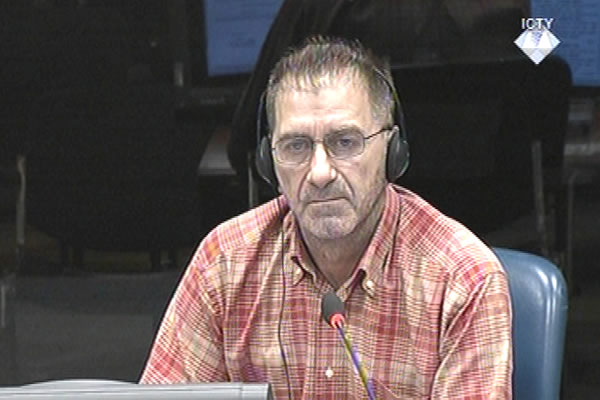Home
NON-SERBS WERE GIVEN ‘ASSISTANCE’ TO LEAVE SANSKI MOST
Mladic’s defense witness Vinko Nikolic testified that Muslims and Croats left Sanski Most ‘at their own request; it was their own decision’ while the municipal authorities only ‘assisted’ them. The prosecutor noted that the assistance in fact consisted of a series of coercive measures that left the non-Serbs with no other choice but to leave
 Vinko Nikolic, defence witness at Rako Mladic trial
Vinko Nikolic, defence witness at Rako Mladic trial During the war Vinko Nikolic was a member of the Crisis Staff in Sanski Most. He was the representative of the Serb Defense Forces (SOS). This was a paramilitary group that became part of the Bosnian Serb Army at the beginning of the conflict as a special unit of the 6th Sana Brigade. Nikolic has already testified before the Tribunal in Radovan Karadzic’s defense. Nikolic’s statement from the Karadzic trial was admitted into evidence at the trial of Ratko Mladic.
Defense counsel Branko Lukic read out the summary of the witness’s statement. In it, Nikolic claims that the Sanski Most authorities didn’t plan the expulsion of non-Serbs from the municipality. Also, 8,000 Muslims were able to remain in their homes until the end of the war, Nikolic noted. According to the witness, loyal non-Serbs were not removed from their jobs and worked as teachers or cadastre clerks. The witness didn’t deny that a large number of non-Serbs left the municipality, but they did so ‘at their own request; it was their decision’. The authorities merely provided ‘assistance’, Nikolic explained.
Prosecutor Amir Zec put it to the witness that the authorities assisted by putting pressure on non-Serbs: they were fired from their jobs, detained at several locations in Sanski Most and transferred to the Manjaca prison camp near Banja Luka. According to the minutes from the Crisis Staff meetings, the witness was among those in charge of firing non-Serbs. Also, the minutes showed that people were transported to Manjaca in trucks that the witness was in charge of, for the municipal authorities. Nedzad Muhic, one of the judges who had lost their job in Sanski Most, and 19 other detainees suffocated on a truck en route to Manjaca. The witness claimed that he was only involved in the firing of the court president and the director of the Health Center. Nikolic also said the civilian police was responsible for the transportation of detainees to Manjaca.
Nikolic claimed that at the end of the war about 8,000 Muslims still lived in the municipality. The prosecutor contested the claim with a document from the Banja Luka State Security Service which states that in February 1995 there were about 3.350 Muslims and about 1,000 Croats living in Sanski Most, out of the pre-war population of more than 30,000. The prosecutor put it to the witness that all those people had been expelled. To corroborate his allegation the prosecutor showed the minutes from a session of the municipal executive board held in late July 1992. According to the document, the departure of non-Serbs should ‘continue because the army and the Serb people demand it’ and Sanski Most should be a ‘Serb’ town. Furthermore, the Informator magazine, published by the Serb Democratic Party municipal board, reported in June 1992 that the ‘most efficient way to deal with the ethnic conflict is to transfer Muslims and Croats to Central Bosnia’. The witness responded that he was not a member of the municipal board and the party. At the time, Nikolic explained, he was on the front lines and didn’t know anything about expulsions.
In the re-examination defense counsel Lukic revisited the issue of the municipal board meeting. He highlighted the fact that the minutes state the evacuation should proceed ‘in a peaceful manner’ and that those who were ‘interested in leaving’ should be provided with transportation. Nikolic retorted that at its meetings, the Crisis Staff discussed only the departure of civilians who ‘expressed their desire to leave’. In Nikolic’s words, the municipal authorities wanted to ‘protect lives even if it meant that people had to move out’. Judge Flugge asked the witness if the goal of that process was to make Sanski Most a ‘Serb town’. ‘Probably’, the witness replied.
Vinko Nikolic was the last witness scheduled for this week. The defense case continues on Monday.
Linked Reports
- Case : Mladic
- 2015-02-04 MUSLIMS LEFT BOSANSKI NOVI ‘VOLUNTARILY’
- 2015-02-03 CROATS HAD TO PAY THEIR WAY THROUGH SERB TERRITORY
- 2015-02-02 CIVILIANS STRONGER THAN ARMY
- 2015-02-09 CONTESTING SREBRENICA PENITENT’S ‘ABSOLUTE UNTRUTHS’
- 2015-02-10 ‘VOLUNTARY’ PRISONERS IN PRIJEDOR PRISON CAMPS
- 2015-02-11 DR. DAVIDOVIC'S DIARY: 'EXPEL FOREVER'
